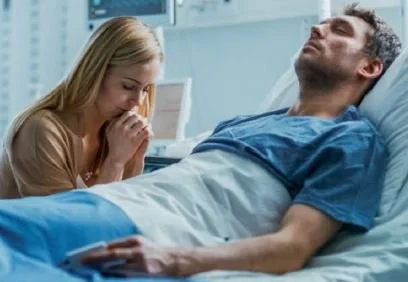In 2011, Chris fractured three vertebrae. We discovered he had developed osteoporosis, caused by a clinical trial drug he was taking. His doctor wanted him to receive an infusion to help reverse the bone loss as quickly as possible. She told him the most common side effects are flu-like symptoms.
I researched the drug options after we got home to see if they would jeopardize his health. I learned they can cause the femur—the strongest bone in the body—to break. But what I found next terrified me.
These drugs are known to cause osteonecrosis of the jawbone (ONJ)—death of the jawbone. Although rare, it has occurred in numerous patients, especially after invasive dental procedures. Chris and I cringed whenever we heard something was “rare” because he was always that rare patient. I saw photograph after photograph of people with ONJ, and it shook me to my core. ONJ risk factors are higher in patients who are taking chemotherapy and corticosteroids. Chris was taking both.
My husband and I were amazingly compatible. I can’t remember ever having a serious argument with him before in our first twenty-seven years of marriage. We were almost always on the same wavelength. Not this time. He felt he needed the infusion. We couldn’t come to an agreement on what to do.
I wondered why the doctor didn’t disclose this possible side effect so we could make an informed decision. Does she expect Chris to die of lung cancer before he would have a chance to develop ONJ? That thought upset me even more.
I confided to my friend Lou Ann how terrified I was. She gave me words of wisdom I never forgot:
“There will probably come a day when Chris says he’s had all the treatment he wants to endure. It’s his body, and you will have to be prepared to respect his wishes. And because it is his body, you need to respect whatever decision he makes regarding his current treatment.”
At our next appointment, I asked about the side effects. It’s a patient’s right to have full disclosure of risks before consenting to treatment. The doctor merely repeated what she had told us before: “He might have flu-like symptoms for the first three days.”
It wasn’t until I specifically asked about ONJ that she admitted it was a possible side effect, but she downplayed the risk. The doctor said we always have to consider the risk versus the benefit of a treatment, and in his case, she felt the benefit strongly outweighed the risk.
Chris consented to the treatment, and it helped him.
I realized that even though we might have wonderful doctors, they were only human. Since they see so many patients, it must be challenging to remember what they have or haven’t told someone. But refusing to leave Chris’s fate in the hands of the doctors, I learned as much about recommended treatments as possible so I could know what questions to ask at appointments. Knowledge was power and could have a profound effect on my husband’s life.
Five years later, as the cancer was taking a toll on Chris’ body and spirit, I remembered my friend’s advice, and I shared her words of wisdom with him. Then I told him, “As much as I don’t want you to die, I know you’re tired, and your quality of life isn’t good. When you decide you’ve had enough, I’ll respect your wishes.”
Chris began going downhill fast. The day before he died, his doctor said the only option left was to drain the fluid off his lung, although it was unlikely we’d see dramatic improvement. Because of that and the risk that it could collapse his only “good” lung, Chris instructed the doctors, "Just make me comfortable." I made sure the doctors had in their records there were to be no heroic efforts.
Chris had this procedure twice before, and we had discussed many times what he could tolerate. We knew of the risks of the procedure, especially given his current condition. I knew it was time to respect his final wishes and allow him to die peacefully and with dignity.
Chris and I were both unbelievably calm in the face of death. We had peace even though our lives were in turmoil. We had grieved together for six years and prepared for this moment. He had equipped me to handle life and discussed my future without him. We had all his affairs in order. Assured of his salvation, he knew his final destination, and he was ready to be with the Lord. Chris was “good to go.”
In one of his early blogs, Chris wrote about his father. “During Mom’s final days with us, Dad continued to teach me, not by his word, but by his actions. He taught me during those days about love—what it means to love another so deeply that, although in your heart you long to keep them with you, sometimes it’s better to let them go.”
He was right. When you love someone, it’s hard to let them go. But sometimes that’s that greatest act of love you can give them.
